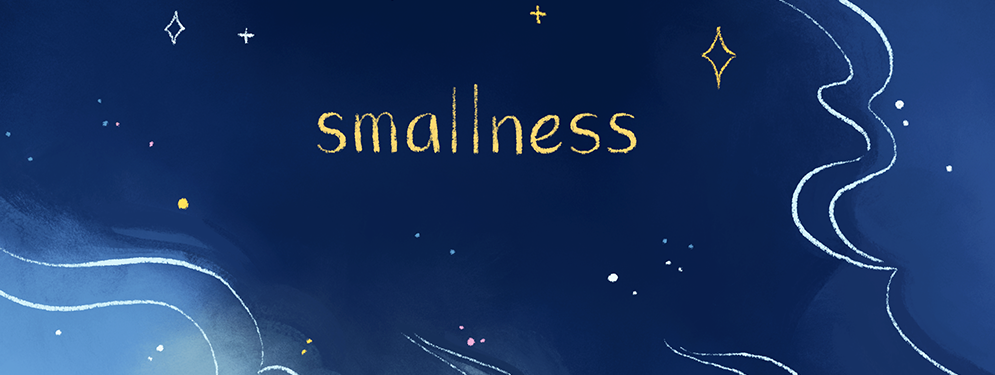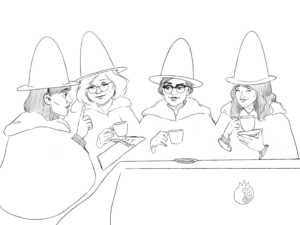In space, can anyone hear you cry?
Just as on Earth, it probably depends, based on the situation. When you suffer a major setback or confront an obstacle, do you isolate yourself, or do you look around for help? Perhaps, as with the characters in Ashanti Fortson’s tender space drama, it’s a little of both. Not too long ago, I came across and reviewed Fortson’s Galanthus, a webcomic about a young space mechanic who flees an oppressive environment in search of a better life. Forston’s latest work, a stand-alone comic called smallness, continues in the vein of telling cathartic, personal stories against a fantastical, expansive landscape.
smallness begins with a tense intergalactic phone call from Akma, our young protagonist, to her parents. She’s telling them she’ll be away on an important assignment, but something is clearly wrong: despite her parents’ eagerness to hear about her work, Akma is terse and vague, fidgeting uncomfortably. She hasn’t been promoted, it turns out, but fired — and not for a minor or unfair reason, but for a legitimately consequential mistake with lasting impact. In smallness, Forston tells the story of Akma’s search for escape, relief, and peace as she deals with this huge blow to her career and her identity, and they do so beautifully, with great care and good humor. On the very first page, amidst a glistening metropolis, at the feet of a giant statue of an anonymous noble figure, Akma simply inserts a coin into a box and picks up a curly-corded phone receiver to talk to people in a whole other galaxy.
This first charming gag is a simple, but effective detail in a comic that’s chock full of small, quiet moments that say so much about Akma and her inner life without a word of dialogue. For two whole pages following the opening conversation, Akma begins her journey exhausted and burdened (judging by her heavy sighs and relentless frowns) even as tantalizing landscapes rush around her. It wasn’t until my second reading of the comic that I realized that one of the more lovely and strange vistas — a handful of domed buildings and tall towers in ruins, seen (and frowned at) by Akma on her flight out of dodge — is actually the result of Akma’s dramatic accident. It isn’t until page 7 that we hear the truth of Akma’s situation in her words, but when we do, it hits like 3gs of force, with a moodily purple-and-gold lit rocket launch, and my new favorite one-liner.
Before this moment, Akma had a lot to prove, and big shoes to fill. Now that it’s all over, it’s no wonder that she first chooses to seek comfort in escape. After all, in space, there’s plenty to escape to, giving Fortson a chance to show off more of their utterly enchanting color work on a jewel-toned ocean planet that looks like it came out of Sailor Neptune’s gayest dreams.
But of course, not even the best among us can escape the gravity of our biggest failures. As Akma is confronted with the enormity of her mistake, she succumbs to self-judgment, berating herself for having the audacity to think she could make a difference. In one of the most poignant scenes of smallness, Akma vents some of her fears and frustrations to her AI companion, Wallace (a sweet geometric blob of crystalline), over a series of closeups: clothes spilling out of their bins, piles of dirty dishes, empty bubbles of sleeping pills. As the pile of clothes grows messier, and the half-eaten food grows mold, we get a sense of not only how badly Akma is suffering, but also how long it takes for her to finally reach out for help.
Forston’s storytelling really shines in this moment of crisis, playing with space and time to drive the narrative forward; not only as we see Akma’s conversation with Wallace stretch across days, but also as she confides in her parents. Comics have a funny way with time: though Akma is not shown explaining the exact details of how she got fired to her parents, that doesn’t mean she didn’t tell them, and at the same time, it doesn’t mean she definitely did. Fortson focuses on what’s most important for anyone in Akma’s situation — namely, the support and validation of the people she loves, in contrast to the blame and shame she’s presently inflicting on herself. But the mystery of just how much she is able to say, how vulnerable she allows herself to be, is not an insignificant one.
Anyone who struggles with the burden of representing an entire group of people through their work, be they disabled, sick, queer, a person of color, or marginalized in any number of ways, will know that admitting failure can feel like the end of the world, or at least the end of everything good. Whether on Earth or in Fortson’s brightly colored hyperspaces, acceptance and understanding are not guaranteed; it is a relief to know that Akma is loved. But more often than not, that is not enough. And so, Akma’s journey continues.
Of all the motifs that smallness touches upon, I’m particularly enamored of the way the comic’s final chapter shows us instances of people helping each other to the best of their abilities. Though Wallace might be unable to give Akma advice during her depressive spell, he can take over her spaceship’s navigation and take her where she needs to go. Later, on a pilgrims’ path, Akma and her fellow seekers guide one another over difficult terrain, stumbling, resting, and smiling along the way. They are bound by their shared search for something that will help them make sense of it all, and no matter how wondrous the vision at the end of the road is, the shared space and purpose between these people is what makes the experience holy. When we are given the opportunity to love and help others, we are also given permission to love and help ourselves.
smallness is a fantastically-crafted comic, with expressive, bold art that almost overshadows its seamless design and excellent timing. It has a familiar, but deeply sincere and nuanced message about overcoming obstacles that I think will truly appeal to readers of all ages. This is a story that you can come back to when you need a reminder that failure is not only not the end of the world, but a necessary part of building a new one.
You can buy smallness in print this weekend at SPX for $15; after the convention, it will be available in print at Fortson’s Etsy shop and as a PDF on Fortson’s itch.io page.








